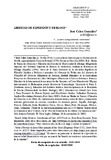Mostrar el registro sencillo del ítem
Libertad de expresión y weblogs
| dc.rights.license | http://creativecommons.org/licenses/by-nc-sa/3.0/ve/ | |
| dc.contributor.author | Calvo González, José | |
| dc.date.accessioned | 2009-09-18T20:20:06Z | |
| dc.date.available | 2009-09-18T20:20:06Z | |
| dc.date.issued | 2009-09-18T20:20:06Z | |
| dc.identifier.uri | http://www.saber.ula.ve/handle/123456789/29414 | |
| dc.description.abstract | La Eurocámara se ha interesado recientemente en auspiciar una regula ción jurídica para los blogs. En julio de 2008 la Comisión europea elaboró un informe tendiente a regular las bitácoras virtuales de sus ciudadanos, a fin de aclarar la responsabilidad de los autores en el contenido que publican o las fuentes que utilizan, para lo cual proponía aplicarles las mismas normas exigidas a las demás formas de expresión pública. El informe fue rechazado en este punto por el Parlamento Europeo en septiembre, si bien señalando la necesidad de abrir un debate público sobre su estatuto legal a fin de determinar y definir cuál fuera su naturaleza jurídica. En esa dirección se orienta el presente artículo, examinando la regulación sobre libertad de expresión en Internet en EEUU, en la Comunidad Europea, y la normativa española aplicable, así como el tratamiento jurisdiccional dado por los Tribunales españoles en procedimientos de depuración de responsabilidades penales y civiles, y también a través de procedimientos administrativos sancionadores. El autor se muestra contrario a la interpretación de las weblogs como medios de comunicación, analogía que rechaza junto a sus efectos jurídicos. | es_VE |
| dc.language.iso | es | es_VE |
| dc.rights | info:eu-repo/semantics/openAccess | |
| dc.subject | Libertad de expresión | es_VE |
| dc.subject | Internet | es_VE |
| dc.subject | Medidas de protección tecnológica | es_VE |
| dc.subject | Libertades civiles y Derechos Humanos | es_VE |
| dc.subject | Europea | es_VE |
| dc.subject | Responsabilidad jurídica de las weblogs | es_VE |
| dc.title | Libertad de expresión y weblogs | es_VE |
| dc.title.alternative | Freedom of speech and weblogs | es_VE |
| dc.type | info:eu-repo/semantics/article | |
| dc.description.abstract1 | The Eurocámara has been interested recently in supporting a legal regulation for blogs. In 2008 July the European Commission elaborated a report destined to regulating the virtual ship’s logs of its citizen internauts, in order to clarify the responsibility of the authors in the content whom they publish or the sources that use, for which proposed to apply the same demanded norms to the other forms of public expression. The report was rejected in this point by the European Parliament in September, although indicating the necessity to open a public debate on its legal statute in order to determine and to define which outside its legal nature. In that direction the present article is oriented, examining the regulation on freedom of speech in Internet in the U.S.A., the European Community, and the applicable Spanish norm, as well the jurisdictional treatment given by the Spanish Courts in procedures of cleansing of criminal and civil responsibilities, and also through sanctioning administrative procedures. The author is in opposition to the interpretation of weblogs like mass media, analogy that she rejects next to his legal effects. | es_VE |
| dc.description.colacion | 53-94 | es_VE |
| dc.description.email | jcalvo@uma.es | es_VE |
| dc.subject.centroinvestigacion | Centro de Investigaciones Jurídicas (CIJ) | es_VE |
| dc.subject.facultad | Facultad de Ciencias Jurídicas y Políticas | es_VE |
| dc.subject.keywords | Freedom of speech | es_VE |
| dc.subject.keywords | Internet | es_VE |
| dc.subject.keywords | Technology Protection measures | es_VE |
| dc.subject.keywords | Law and censorware politics censorship in EEUU | es_VE |
| dc.subject.keywords | Censure | es_VE |
| dc.subject.keywords | Chilling effect | es_VE |
| dc.subject.keywords | Civil liberties and Human rights | es_VE |
| dc.subject.keywords | European Union | es_VE |
| dc.subject.publicacionelectronica | Revista Dikaiosyne | es_VE |
| dc.subject.seccion | Revista Dikaiosyne: Artículos | es_VE |
| dc.subject.thematiccategory | Ciencias Jurídicas y Políticas | es_VE |
| dc.subject.tipo | Revistas | es_VE |
| dc.type.media | Texto | es_VE |
Ficheros en el ítem
Este ítem aparece en la(s) siguiente(s) colección(ones)
-
Dikaiosyne - Nº 022 Año XII.
enero - junio 2009



